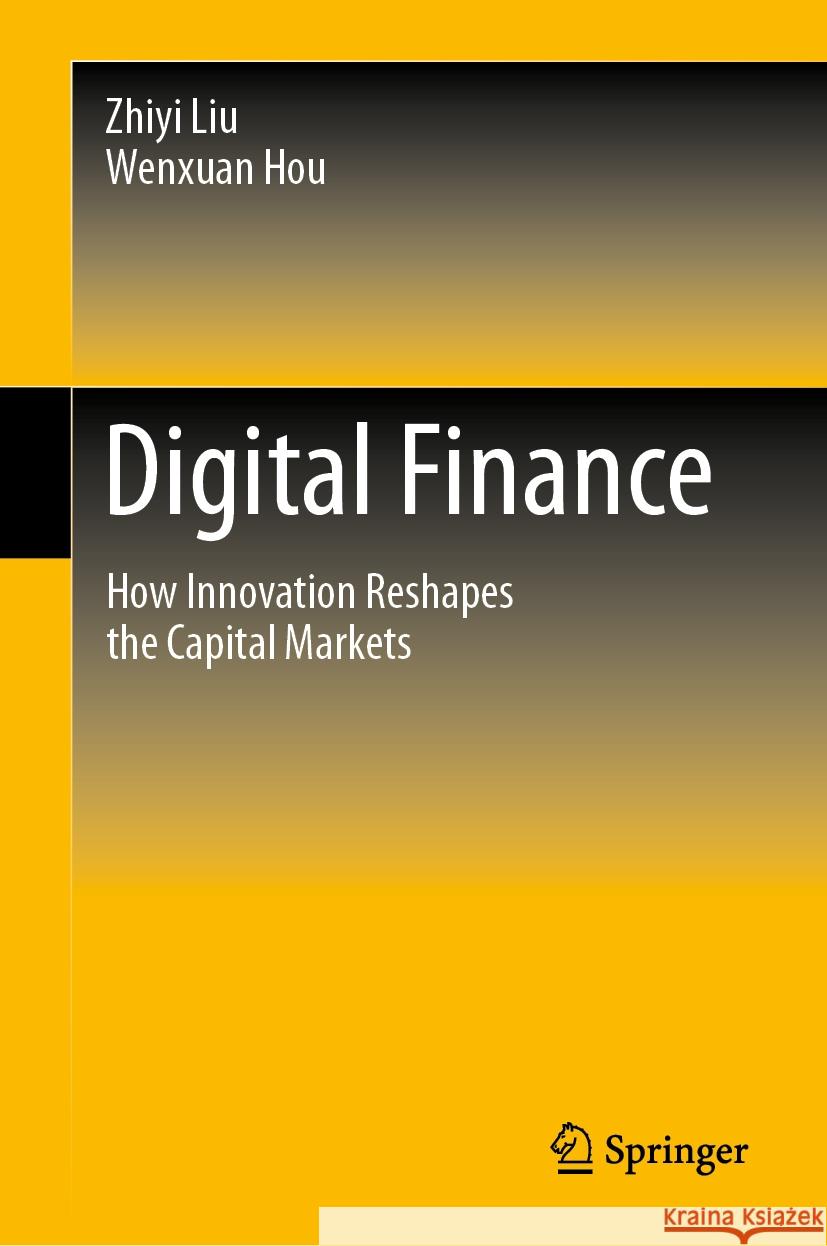Digital Finance: How Innovation Reshapes the Capital Markets » książka



Digital Finance: How Innovation Reshapes the Capital Markets
ISBN-13: 9789819973040 / Angielski
Digital Finance: How Innovation Reshapes the Capital Markets
ISBN-13: 9789819973040 / Angielski
(netto: 585,86 VAT: 5%)
Najniższa cena z 30 dni: 539,74
ok. 16-18 dni roboczych.
Darmowa dostawa!
Table of Contents. Introduction. - Definition of Digital Finance. - Evolution of Digital Finance. - Importance of Digital Finance in Modern Economy.- Interdisciplinary Understanding of Digital Finance.- Digital Finance and Capitalism.- Chapter 1: Opportunities and Challenges for the Development of Digital Finance.- Important Theories Influencing the Development of Digital Finance.- Key Factors Affecting the Development of Digital Finance.-Challenges and Opportunities Facing Digital Finance.- Chapter 2: Monetary Theory Research on digital finance.-The importance of monetary theory in digital finance.-Traditional monetary theory and its relationship with digital finance.- The impact of digital finance on monetary theory.- Chapter 3: Innovation and Regulation in Digital Finance.- An overview on innovation and regulation in digital finance.-Digital financial regulatory framework.- Innovative models for digital finance.- Challenges and opportunities facing innovation and regulation in digital finance.- Chapter 4: Digitization by Commercial Banks.- An overview on digitization by commercial banks.- Digital banking services &products.- Digitization transformation strategy.- Challenges & opportunities faced by commercial banks' digitization.- Chapter 5: Digital Wealth Management.- An overview on digital wealth management.- Innovative models for managing wealth digitally.- Digital platforms & technologies used to manage wealth.- Challenges & opportunities facing digital wealth management.- Chapter 6: Central Bank's Cryptocurrency.- Central bank cryptocurrency overview.- CBDC model & architecture.- Impact on monetary policy & financial stability.- Challenges & opportunities faced by central bank cryptocurrency.- Chapter7 :Digital Financial System And International Monetary System. - Overview Of The Relationship Between The Two Systems.- Digitized Financial Transactions And Cross-Border Payments.- Challenges And Opportunities For Both Systems.- Chapter8 :Cybersecurity And Data Privacy In The Context Of Digitized Financial Services .- Overview On Cybersecurity And Data Privacy In Digitized Financial Services.- Threats, Vulnerabilities, Risks In Digitized Financial Services.- Data Protection Regulations And Compliance.- Challenges & Opportunities In Cybersecurity And Data Privacy For Digital Finance.- Chapter 9: Social and Environmental Impacts of Digital Finance.- Overview Of The Social And Environmental Impacts Of Digital Finance.- Financial Inclusion and Poverty Reduction.- Sustainable finance and green investment.- Challenges & Opportunities for the social and environmental impacts of digital finance.- Chapter 10: Future Directions of Digital Finance.- New Trends And Technologies in Digital Finance.- Impact on Policy, Practice, and Research.- Final Thoughts and Recommendations for Stakeholders.
Zhiyi Liu is a digital economist and artificial intelligence scientist, currently serving as the Chief Scientist at Dongfang Wealth. He is also a researcher at the Shanghai AI Social Governance Collaborative Innovation Center, an advisor to the Shanghai Artificial Intelligence Laboratory, and a member of the AI Ethics Working Committee of the Chinese Association for Artificial Intelligence. Furthermore, Liu serves as the executive director of the Center for Computational Law and Artificial Intelligence Ethics Research at Shanghai Jiao Tong University, special research fellow at the Antai AI and Marketing Research Center at Shanghai Jiao Tong University, and chairman of the AI Ethics Committee of the Shanghai Open Technology Information Association. He is an ethics expert on the IEC Bio-Digital Fusion System Evaluation Group (IEC/SMB/SEG12) under the International Electrotechnical Commission (IEC), an expert in China's national artificial intelligence standard overall group, a member of the AIIA Alliance's Trusted AI Expert Committee, and an expert committee member of the Shanghai Artificial Intelligence Technology Association. His main areas of research include artificial intelligence ethics and governance, the intelligent economy, and digital economics. He has authored several academic books, including "Intelligent Economy," "Digital Economics," and "AI & Blockchain Intelligence," and has also published multiple English-language monographs while translating works by overseas scholars.
Hou Wenxuan: Member of the European Academy of Sciences, Director of the China Research Center at the University of Edinburgh in the UK, Professor of Finance and PhD. He holds a PhD in Finance from Manchester Business School and is a tenured professor at the University of Edinburgh Business School. He has also served as Director of the China Research Center at Durham University and Associate Professor (tenure track) in Finance, with a PhD in Finance from Manchester Business School. He is currently a Distinguished Professor at Shanghai Lixin Accounting and Finance College, Tenured Professor at Edinburgh Business School, and President of Scotland's Young Academy. Previously he worked for Manchester University and Bradford Management School. His research interests include asset pricing and corporate governance. His papers have been included in academic conferences such as EFA (European Financial Association), EAA (European Accounting Association), FMA (Financial Management Association) Annual Meetings, etc., as well as top academic journals such as European Journal of Finance, International Small Business Journal, Journal of Business Ethics Special Issue which he co-edited; he has also organized special issue conferences held by Durham University in UK Shenzhen & Beijing.
This book presents an overview of the development of digital finance. It covers various aspects of digital
finance, including its definition, evolution, and importance in modern economics. It explores the interdisciplinary perspective of digital finance and its relationship with capitalism, and discusses the key factors influencing the development of digital finance, as well as the challenges and opportunities it faces. It also offers practical insights into digital finance, such as the innovative digital financial models and
platforms and the strategies of digital transformation in commercial banks. What is new about this approach is that the book takes a holistic view of digital finance, covering not only its economic and financial aspects but also its social and environmental impacts. It also offers a critical evaluation of the challenges and opportunities in digital finance from a global perspective. In this book, authors look into the impact of digital finance in various fields, such as monetary theory, wealth management, central bank digital currency, international monetary system, and network security and data privacy.
1997-2026 DolnySlask.com Agencja Internetowa
KrainaKsiazek.PL - Księgarnia Internetowa









